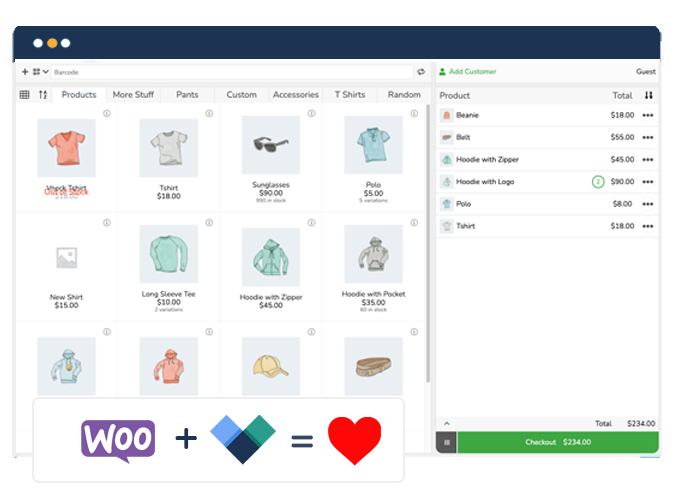The adoption of wireless Point of Sale (POS) systems in the current retail landscape represents a significant leap forward from traditional solutions. These innovative systems offer businesses several benefits that directly contribute to enhanced customer experiences, streamlined sales efficiency, improved inventory management, and, ultimately, increased revenue.
Unlike their wired counterparts, wireless POS machines facilitate a more dynamic retail setting, allowing staff to conduct transactions anywhere on the floor, thereby reducing wait times and improving customer satisfaction. This mobility also extends to improved inventory management, as employees can instantly access stock levels and product information, ensuring that customer queries are handled with speed and accuracy.
Wireless POS solutions highlight a broader trend in retail technology, one that emphasizes flexibility, efficiency, and data-driven decision-making. With the market flooded with various products and services, each promising to be the ultimate solution for your organization, the task of choosing the right system can be quite challenging.
This article provides an overview of the current state of the wireless POS market, followed by a detailed comparison of the most popular tools available. Whether you own a small cafe or a growing retail chain, understanding the key benefits and functionalities of these systems will empower you to select the wireless POS machine that best aligns with your business objectives and operational needs.
Exploring the wireless POS landscape in retail
Wireless POS systems enable enterprises to process transactions and engage with customers anywhere, without the limitations imposed by traditional wired systems. This mobility enhances customer service and offers significant operational flexibility as well. Retailers can adopt a more dynamic approach to sales, moving beyond the counter to interact with customers on the shop floor, at outdoor events, or in any setting that was previously impractical for sales transactions.
The variety of wireless POS systems available today caters to the diverse needs of retailers:
- All-in-one solutions offer a comprehensive package, including hardware and software capable of handling sales, inventory, and customer management from a single device.
- Tablet-based systems leverage popular consumer technology, turning Android tablets and iPads into powerful POS systems and sales tools with intuitive interfaces and extensive app ecosystems.
- Mobile POS devices, such as smartphones equipped with payment processing capabilities, represent the ultimate in flexibility, allowing transactions to be processed on the go, ideal for pop-up stores, food trucks, and outdoor markets.
The backbone of many modern wireless POS systems is cloud technology. Cloud-based systems streamline backend operations by centralizing data storage, processing, and management in a secure, online environment. This setup simplifies IT infrastructure and also provides retailers with real-time analytics and insights. By accessing up-to-date information on sales trends, inventory levels, and customer preferences, companies can make informed decisions that drive growth and improve operational efficiency.
The combination of mobility, flexibility, and real-time data analytics positions wireless POS systems as a transformative tool for retailers looking to thrive in today’s competitive marketplace.
Key considerations for selecting a mobile POS system
Selecting the right mobile POS system is a pivotal decision for any retail operation, impacting everything from day-to-day efficiency to long-term growth. The ideal mobile POS system should streamline operations, enhance the customer experience, and integrate seamlessly with existing business processes.
Here are the key factors businesses should consider when choosing a mobile POS system:
- Business size and scalability: The chosen system should be capable of growing with your enterprise. This means it must handle increasing transaction volumes and expanding inventory management needs without requiring a complete system overhaul.
- Integration with existing systems: A mobile POS system should easily integrate with your current setup, including inventory, accounting, and eCommerce platforms. This ensures a smooth workflow and provides a unified view of operations, enhancing efficiency and reducing the potential for errors.
- Payment processing options: Supporting a wide range of payment methods (such as credit cards, digital wallets, and even traditional methods like cash and checks) is essential. This flexibility can improve customer satisfaction and sales opportunities.
- Hardware and operating system requirements: Ideally, a mobile POS system should leverage existing hardware, such as smartphones, tablets, or laptops. This compatibility reduces initial investment costs and allows firms to utilize devices they are already familiar with.
- Feature set specific to industry: The needs of retail sectors vary greatly; thus, a mobile POS system should offer features tailored to your specific industry. This could include barcode scanning for quick inventory checks, receipt printing capabilities, and comprehensive customer management tools.
- Usability and training requirements: An intuitive user interface that requires minimal training is vital for operational efficiency. Employees should be able to learn the system quickly, reducing downtime and enhancing customer interactions.
- Security and data protection: Protecting sensitive customer and business data is paramount. The chosen mobile POS system must adhere to industry standards like PCI DSS compliance to ensure data security and build trust among customers.
Comparing top wireless POS solutions for retail businesses
Best overall: Jovvie
Jovvie distinguishes itself in the crowded POS marketplace as the ideal choice for all kinds of retail businesses, thanks to its comprehensive suite of features designed to tackle the specific challenges of both in-person and online sales channels.
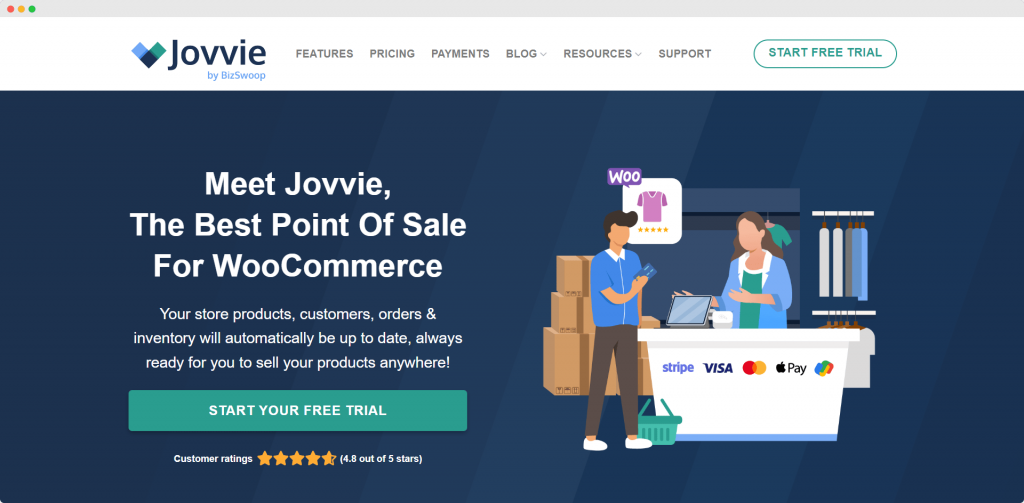
Let’s take a look at the key features of Jovvie:
- System integration: Jovvie’s integration with WooCommerce is particularly noteworthy, providing real-time inventory updates that ensure sales data is always accurate and up-to-date. This seamless synchronization eliminates the common pain points associated with managing inventory across multiple platforms, making Jovvie an invaluable tool for retailers looking to optimize their operations.
- Scalability: For enterprises concerned with scalability, all of Jovvie’s plans offer unlimited transactions, products, and store locations. This capability ensures that as your business grows, your POS system grows with you, eliminating the need for costly upgrades or system changes.
- Hardware compatibility: Jovvie’s flexibility extends to hardware compatibility as well; it operates effortlessly with existing iOS or Android devices, including laptops, smartphones, and tablets. This versatility negates the need for additional investments in POS-specific hardware, presenting a cost-effective solution for businesses of any size.
- Usability: Moreover, Jovvie’s user-friendly interface simplifies the implementation process, reducing the training requirements for staff and ensuring a smooth transition to the new system.
- Security: This is another critical area where Jovvie excels, offering advanced features to protect customer data and prevent fraud, thereby ensuring that transactions are efficient and secure.
- Pricing: Jovvie’s pricing starts at $29 a month. This hosted POS is immediately operational, providing instant synchronization with WooCommerce in real-time and automatic updates. Users enjoy rapid speed, dependable security, and consistent uptime performance.
Best for small organizations: Square POS
Square offers a web-based POS solution compatible with various eCommerce platforms, including WooCommerce, Wix, BigCommerce, and Drupal Commerce, making it suitable for omnichannel stores.
Square is renowned for its ease of use and straightforward pricing, thus making it an ideal choice for small businesses. With no monthly fees for its basic service and a simple per-transaction cost structure, Square enables small retailers to adopt a wireless POS system without a significant upfront investment.
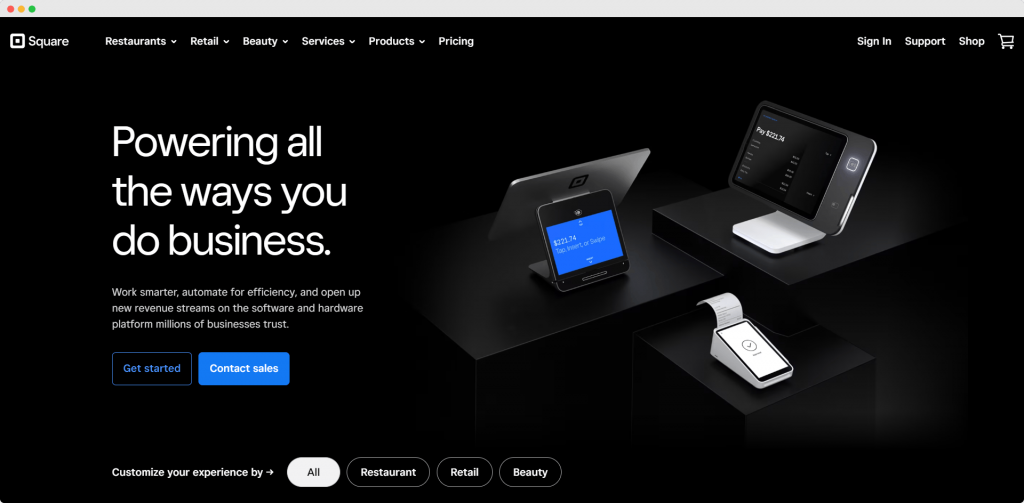
Its ecosystem of products offers everything from inventory management to online sales, all integrated into a user-friendly interface. However, it has drawbacks such as user-reported technical issues, slow processing times, and a notably poor integration with WooCommerce, which may deter WooCommerce users from choosing it.
Best for restaurants: Toast POS
Toast, tailored for cafes and restaurants, offers a web-based system with a focus on omnichannel sales and online ordering, included in the “Essentials” plan starting at $165 per month.
Its advantages include an intuitive interface, excellent offline capabilities, included hardware with free installation, and a flexible pay-as-you-go pricing option. Its cloud-based system allows for real-time updates and analytics, crucial for the fast-paced restaurant environment.
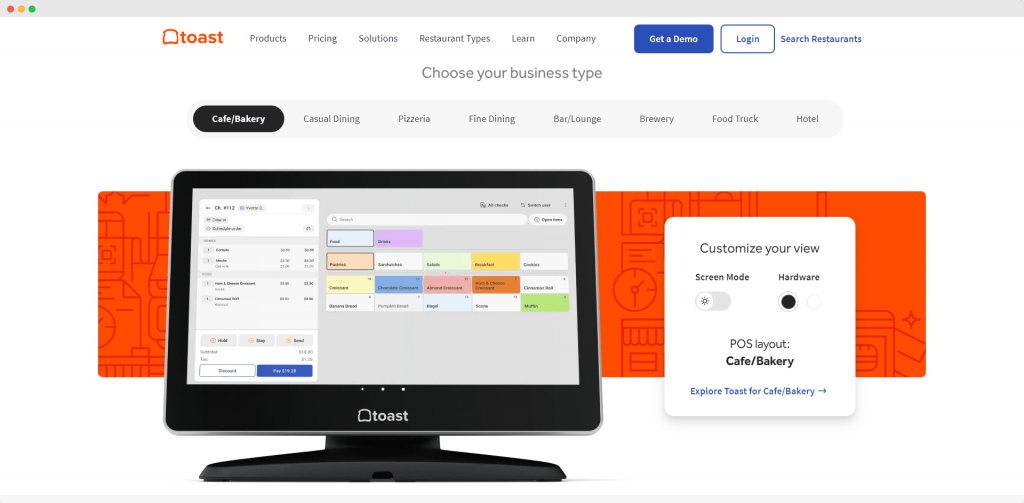
Disadvantages include high transaction fees for the pay-as-you-go plan and a lack of hardware flexibility, as it requires using Toast’s dedicated hardware and payment processor. Moreover, online ordering is restricted and does not allow integration with your website, and the platform offers limiting branding flexibility and user experience control. Additionally, many advanced features require purchasing the more expensive essentials plan or obtaining a custom quote.
Best for cafes & food trucks: TouchBistro
Designed with the unique needs of cafes and food trucks in mind, TouchBistro provides a mobile POS solution that enhances order efficiency and customer service. Its features include tableside ordering, menu management, and sales analytics, all accessible from an iPad interface. TouchBistro’s cloud-based reporting and support for various payment methods make it a versatile option for mobile eateries.
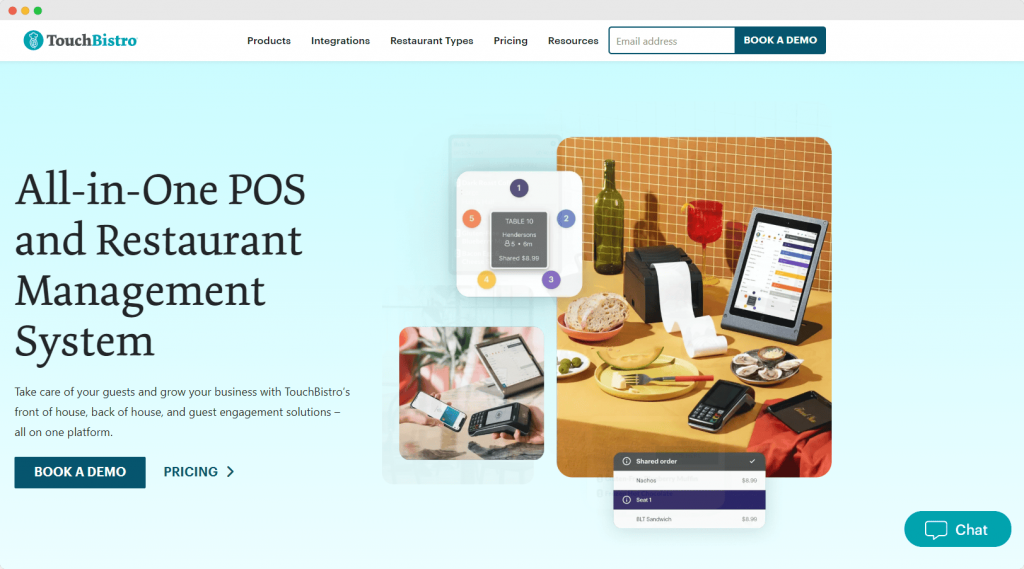
However, while starting at $69 per month, TouchBistro’s base plan includes only basic features, and more advanced functionalities are available as costly add-ons. For example, adding gift card payments or online ordering incurs additional monthly fees, unlike some alternatives where these features are included in the base package.
Best for high sales volumes: Helcim
Helcim caters to businesses with high transaction volumes, offering competitive rates that decrease as sales increase. It supports a wide array of payment options and integrates with various accounting and eCommerce platforms, making it suitable for retailers looking to scale.

Helcim’s emphasis on transparency and security further adds to its appeal for larger operations. It offers a simple and cost-effective option for SMBs to accept credit card payments, whether in-person or online. The Helcim Smart Terminal, featuring a standalone touchscreen and built-in Helcim POS, is available for $329 (annual) or through five monthly payments of $68 each.
Best for mobile-only systems: Clover
Clover‘s flexibility and comprehensive suite of features make it ideal for firms seeking a mobile-only POS solution. Its customizable software and hardware options can adapt to various retail settings, from pop-up shops to established stores. Clover also offers robust inventory management and customer loyalty programs, enhancing its utility for mobile operations.
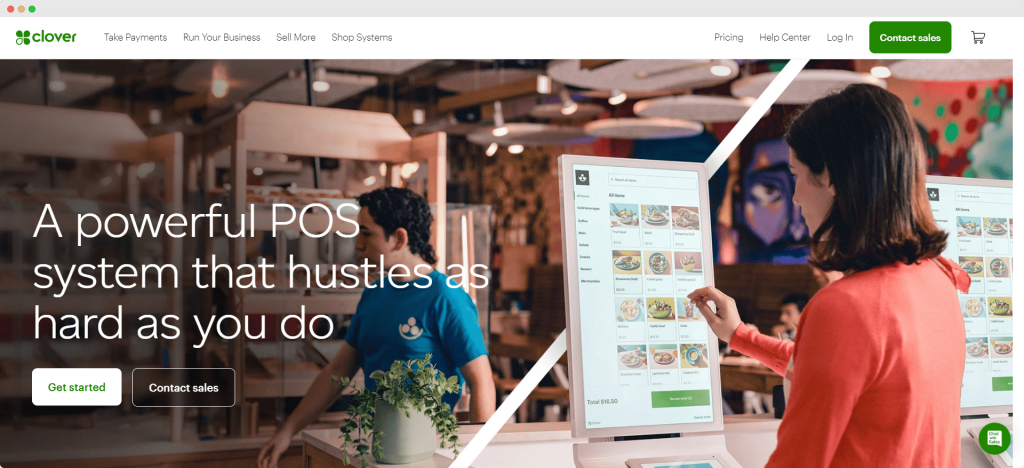
Starting at $14.95 per month for retail stores, Clover’s pricing varies according to business needs and initial hardware fees. It provides a diverse hardware selection to meet specific business requirements. Additionally, Clover integrates with platforms like Shopify, WooCommerce, and Magento, offering built-in tools for sales reporting, inventory, customer, and employee management.
However, Clover’s main limitation is its requirement to use proprietary hardware and payment processing, which, along with upfront hardware costs, can challenge business scalability.
Best for online-first operations: Shopify
For businesses that started online and are branching into physical retail, Shopify offers a seamless transition. Its POS system integrates directly with Shopify’s eCommerce platform, providing unified inventory management and sales tracking. Shopify consolidates all commerce activities onto a single platform, allowing business owners to monitor the entire sales process – from order receipt to post-sale analytics – through one admin panel.
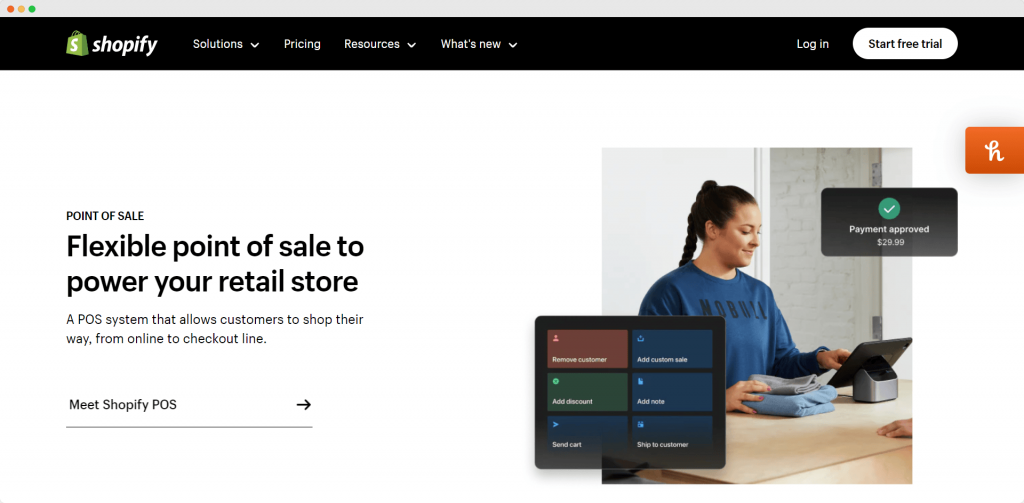
As a secure, cloud-based, and hosted solution, Shopify ensures data safety and accessibility from any internet-connected device, offering the flexibility to manage your business from any location.
Shopify POS provides two software options: POS Lite and POS Pro. All Shopify paid plans, (aside from Shopify Starter) come with POS Lite included. For each location, POS Pro is available at a monthly fee of $89. Shopify’s user-friendly interface and support for a wide range of payment processors make it a solid choice for expanding online businesses into the physical realm.
Here’s a comparative chart for the POS systems discussed, covering their best use case, pricing models, compatibility specifics, and user interfaces. This table provides a snapshot of each system’s primary features, aiming to assist in selecting the most suitable POS solution based on specific retail business needs.
| POS System | Best For | Pricing | Compatibility | User Interface |
| Jovvie | All Retail Businesses | Monthly subscription | iOS, Android, Web | Intuitive |
| Square | Small Organizations | Per Transaction | iOS, Android | Simple |
| Toast | Restaurants | Monthly Subscription | Android, Web | Restaurant-Focused |
| TouchBistro | Cafes & Food Trucks | Monthly Subscription | iOS | Food Service Oriented |
| Helcim | High Sales Volumes | Volume-based | iOS, Android, Web | Transparent |
| Clover | Only-Mobile Systems | Monthly + Hardware | iOS, Android | Flexible |
| Shopify | Online-First Operations | Monthly Subscription | iOS, Android, Web | eCommerce Integrated |
By considering these options in light of your specific business needs, retail owners can select a wireless POS system that meets their current requirements and also supports future growth and success.
Next steps: Implementing Jovvie in your retail business
In the fast-evolving retail industry, choosing the right wireless POS system is very important. Jovvie emerges as a leading choice for retail organizations, offering a solution that aligns with their diverse needs and propels them toward efficiency and growth. Implementing Jovvie means embracing a system designed to streamline operations, enhance customer interactions, and simplify the management of both in-person and online sales channels.
For businesses, transitioning to a new POS system can seem daunting, with challenges like data migration, system compatibility, and the potential learning curve often at the forefront of retailers’ concerns. However, Jovvie’s features are carefully crafted to address and mitigate these issues, ensuring a smooth transition. Its compatibility with existing hardware, alongside an intuitive interface, minimizes disruptions, allowing businesses to continue operations seamlessly.
Embrace the future of retail with a POS system that grows with you, understands your challenges, and offers solutions. Let Jovvie be the catalyst for your business’s next leap forward.
Ready to elevate your retail business with Jovvie? Then sign up for a free trial, schedule a demo, or reach out to the Jovvie sales team for a personalized consultation.


